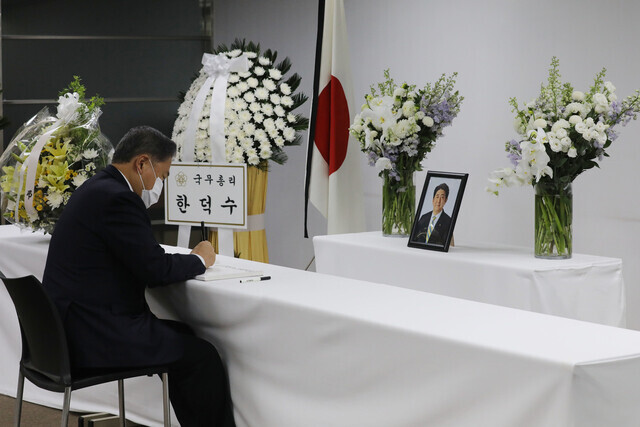hankyoreh
Links to other country sites 다른 나라 사이트 링크
Upheavals in Japan throw cold water on Yoon’s push to improve ties

Recent upheavals in the Japanese political situation, as proponents of amending the country’s pacifist constitution captured a landslide victory in the House of Councillors election in the wake of former Prime Minister Shinzo Abe’s death, are poised to have an inevitable impact on the Yoon Suk-yeol administration’s efforts to improve relations with Tokyo.
With a change in Japan’s stance on bilateral issues appearing even more out of reach, Seoul is watching internal developments there closely as it tries to figure out a response plan.
To begin with, the Yoon administration is showing its respect with condolence messages for Abe’s death. On Monday morning, Minister of Foreign Affairs Park Jin visited a memorial to Abe set up at the Japanese Embassy in downtown Seoul.
A day earlier, the presidential office said that Yoon would “also be visiting the Japanese Embassy’s memorial shortly to pay his respects to former Prime Minister Abe.” He further plans to send a delegation to Japan to express condolences, with Park taking part alongside Prime Minister Han Duck-soo, Office of National Security Director Kim Sung-han, and National Assembly Deputy Speaker Chung Jin-suk.
Seoul has repeatedly emphasized the importance of improving ties with Tokyo. Meeting with reporters after his condolence visit, Park described South Korea and Japan as “very important cooperation partners who share [values of] democracy and the market economy.”
“We believe that restoring South Korea-Japan relations accords with our shared interests, and we will work to improve bilateral relations,” he added.
At a regular press conference the same day, Park said he intended to “focus efforts on working quickly to improve South Korea-Japan relations.”
But Japan’s state of mourning appears likely to create setbacks for his plans to visit the country to push for improvements in bilateral ties.
“While nothing has been finalized, we had been coordinating a schedule for visiting Japan when the shocking event of former Prime Minister Abe’s shooting death occurred,” Park explained, adding that his ministry “plans to continue focusing on related efforts, including my visit to Japan, at a time that is convenient for both sides.”
In the wake of the House of Councillors election, Japan is expected to form a new Cabinet in August. This means that Tokyo’s political focus for the time being will be on domestic issues rather than international relations.
Another potential variable is the response of current Prime Minister Fumio Kishida to the results showing more than two-thirds of House of Councillors seats — the amount needed to present a constitutional amendment plan — going to advocates of an amendment in the ruling Liberal Democratic Party (LDP), and coalition parties Komeito, Japan Innovation Party, and the Democratic Party for the People
Shortly after the election, Kishida said he wanted to “connect [the issue] to a national referendum as quickly as possible.”
A full-scale debate in Japan over the amendment of Article 9 of its constitution — a symbol of pacifism in place for over seven decades — could have a negative impact on the push to improve relations between Seoul and Tokyo.
Park said it would be “inappropriate for [him] to comment on Japan’s domestic political issues.”
“We intend to continue watching Japan’s domestic political situation closely, while making continued efforts to improve South Korea-Japan relations,” he added.
South Korea may also have to adjust the tempo of a joint civilian-government council to resolve the issue of compensation for survivors of forced labor mobilization during the Japanese occupation, which Japan has demanded as a precondition for mending ties.
With Tokyo almost certain to keep in place the hard-line foreign policy approach that Abe practiced while in office, any fumbles with the solution could result in a backlash over perceived “unconditional concessions.”
By Jung In-hwan, staff reporter
Please direct questions or comments to [english@hani.co.kr]

Editorial・opinion
![[Editorial] Penalties for airing allegations against Korea’s first lady endanger free press [Editorial] Penalties for airing allegations against Korea’s first lady endanger free press](https://flexible.img.hani.co.kr/flexible/normal/500/300/imgdb/original/2024/0502/1817146398095106.jpg) [Editorial] Penalties for airing allegations against Korea’s first lady endanger free press
[Editorial] Penalties for airing allegations against Korea’s first lady endanger free press![[Editorial] Yoon must halt procurement of SM-3 interceptor missiles [Editorial] Yoon must halt procurement of SM-3 interceptor missiles](https://flexible.img.hani.co.kr/flexible/normal/500/300/imgdb/child/2024/0501/17145495551605_1717145495195344.jpg) [Editorial] Yoon must halt procurement of SM-3 interceptor missiles
[Editorial] Yoon must halt procurement of SM-3 interceptor missiles- [Guest essay] Maybe Korea’s rapid population decline is an opportunity, not a crisis
- [Column] Can Yoon steer diplomacy with Russia, China back on track?
- [Column] Season 2 of special prosecutor probe may be coming to Korea soon
- [Column] Park Geun-hye déjà vu in Yoon Suk-yeol
- [Editorial] New weight of N. Korea’s nuclear threats makes dialogue all the more urgent
- [Guest essay] The real reason Korea’s new right wants to dub Rhee a founding father
- [Column] ‘Choson’: Is it time we start referring to N. Korea in its own terms?
- [Editorial] Japan’s rewriting of history with Korea has gone too far
Most viewed articles
- 1[Editorial] Penalties for airing allegations against Korea’s first lady endanger free press
- 2Months and months of overdue wages are pushing migrant workers in Korea into debt
- 3In rejecting statute of limitations defense in massacre case, Korean court faces up to Vietnam War a
- 4Historic court ruling recognizes Korean state culpability for massacre in Vietnam
- 51 in 3 S. Korean security experts support nuclear armament, CSIS finds
- 6“Those souls can rest now”: Vietnam massacre survivor reacts to Korean court win
- 7[Reporter’s notebook] In Min’s world, she’s the artist — and NewJeans is her art
- 8[Editorial] Verdict on Korea’s massacre in Vietnam a first step in atonement
- 960% of young Koreans see no need to have kids after marriage
- 10[Editorial] Yoon must halt procurement of SM-3 interceptor missiles